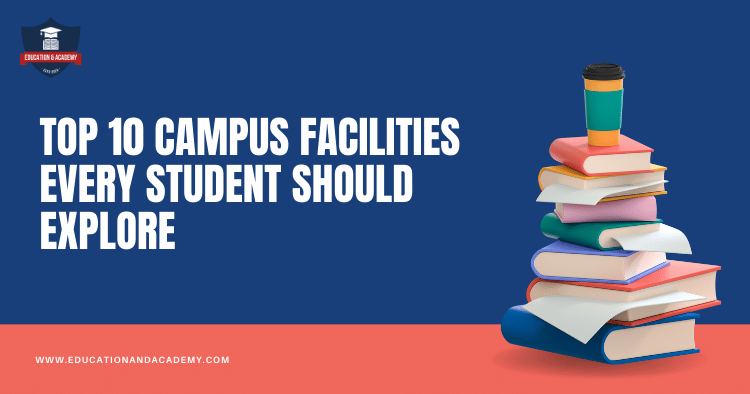Table of Contents
- Introduction
- 1. Libraries: The Knowledge Hub
- 2. Study Lounges: Collaborative Spaces
- 3. Recreation Centers: Stay Active
- 4. Cafeterias and Dining Halls: Fuel Your Mind
- 5. Health and Wellness Centers: Prioritize Your Health
- 6. Career Services: Your Future Starts Here
- 7. Technology Labs: Innovate and Create
- 8. Art and Performance Spaces: Express Yourself
- 9. Student Organizations and Clubs: Get Involved
- 10. Housing and Accommodation: Home Away From Home
- FAQs
- Conclusion
Introduction
Attending college is not just about attending lectures and taking exams; it’s a transformative journey filled with opportunities to explore, learn, and grow. One of the best ways to maximize your college experience is by taking full advantage of the campus facilities available to you. In this blog post, we’ll dive into the top ten campus facilities every student should explore, from libraries to recreation centers, ensuring you get the most out of your education.
1. Libraries: The Knowledge Hub
Why Explore?
Libraries are often considered the heart of any campus. They provide an extensive collection of books, journals, and digital resources that can help you with your studies. Modern libraries are not just about silence and solitude; they often feature collaborative spaces and technology hubs.
Features to Look For:
- Study Rooms: Private spaces where you can focus.
- Tech Resources: Computers, printers, and even 3D printers for student use.
- Events and Workshops: Many libraries host events that can enhance your learning experience.
For more information about library resources, check out the American Library Association.
2. Study Lounges: Collaborative Spaces
The Importance of Collaboration
Study lounges are designed for students who prefer a more social learning environment. These spaces encourage collaboration and group study, which can enhance understanding and retention of material.
Highlights:
- Flexible Seating: Comfortable furniture that promotes interaction.
- Whiteboards and Smartboards: Useful tools for brainstorming and presenting ideas.
- Access to Snacks & Beverages: Many lounges provide vending machines or cafes for quick refueling.
3. Recreation Centers: Stay Active
Keeping Fit and Healthy
Physical health is vital for academic success. Recreation centers offer various facilities for students to stay active and relieve stress.
What to Expect:
- Gyms and Fitness Classes: From yoga to kickboxing, there’s something for everyone.
- Swimming Pools: Great for a refreshing workout.
- Sports Courts: Basketball, tennis, and racquetball courts for competitive play.
Check your university’s recreation center for schedules and membership details.
4. Cafeterias and Dining Halls: Fuel Your Mind
Eating Well for Academic Success
Nutrition plays a key role in your ability to study and perform academically. Cafeterias and dining halls provide students with various meal options to keep them energized.
Menu Features:
- Healthy Options: Look for salad bars, vegetarian, and vegan choices.
- Cultural Cuisine: Explore different culinary traditions from around the world.
- Meal Plans: Many universities offer flexible meal plans that suit different budgets.
For nutrition tips for students, visit ChooseMyPlate.gov.
5. Health and Wellness Centers: Prioritize Your Health
Mental and Physical Health Matters
Health and wellness centers are essential for maintaining your overall well-being during your academic journey. They offer services that cater to both mental and physical health.
Services Provided:
- Counseling Services: Support for mental health issues and stress management.
- Physical Health Services: Routine check-ups, vaccinations, and emergency care.
- Wellness Programs: Workshops on stress management, nutrition, and fitness.
Explore more about health resources at The American College Health Association.
6. Career Services: Your Future Starts Here
Plan for Your Career Path
Career services are invaluable for students looking to enter the workforce after graduation. They provide resources to help you navigate the job market.
Key Offerings:
- Resume Workshops: Learn how to craft an impressive CV.
- Internship Opportunities: Access to internships that align with your career goals.
- Networking Events: Meet industry professionals and alumni.
For more information on career readiness, visit NACE.
7. Technology Labs: Innovate and Create
Embrace Innovation
Technology labs are critical for students pursuing degrees in STEM fields or any technology-related area. These labs often feature cutting-edge technology and resources.
Available Resources:
- Software and Hardware: Access to specialized software for projects.
- Workshops: Hands-on training sessions for different technologies.
- Collaborative Projects: Opportunities to work on group projects with peers.
Explore more about tech resources at EDUCAUSE.
8. Art and Performance Spaces: Express Yourself
Unleash Your Creativity
Art and performance spaces allow students to express their creativity through various mediums. They are vital for those studying arts or simply looking to engage in creative activities.
Facilities Include:
- Studios for Visual Arts: Spaces for painting, sculpture, and mixed media.
- Theaters and Performance Halls: Venues for drama, music, and dance performances.
- Exhibition Spaces: Opportunities to showcase student artwork.
9. Student Organizations and Clubs: Get Involved
Build Your Community
Student organizations and clubs are a fantastic way to meet new people, develop new skills, and enrich your college experience. They cater to a wide range of interests.
Types of Organizations:
- Academic Clubs: Focus on specific fields of study.
- Cultural Organizations: Celebrate diversity and cultural awareness.
- Recreational Clubs: Engage in sports, hobbies, and outdoor activities.
Joining a club can enhance your college life while helping you build valuable connections.
10. Housing and Accommodation: Home Away From Home
Finding Your Space
Your living situation can significantly impact your college experience. Campus housing options often provide a sense of community and support.
What to Consider:
- On-Campus vs. Off-Campus: Weigh the pros and cons of each option.
- Amenities: Look for housing that offers a study lounge, kitchen facilities, and laundry services.
- Roommate Compatibility: Consider living with someone who shares similar interests and study habits.
FAQs
1. How can I find out about campus facilities?
Most universities provide a campus map and resource guide on their official websites. Additionally, student orientation programs are a great way to learn about available facilities.
2. Are campus facilities free to use?
Many facilities are included in tuition fees, but some may require additional fees or memberships, especially for gyms and specialized services.
3. Can I access these facilities if I am a part-time student?
Yes, most campus facilities are available to all enrolled students, regardless of their course load.
Conclusion
Exploring campus facilities is essential for making the most of your college experience. From libraries to recreation centers, each facility offers unique opportunities to enhance your learning and personal growth. Be proactive and take the time to discover what your campus has to offer; you won’t regret it! Whether you’re looking to study, socialize, or unwind, there’s always something waiting for you on campus.
For more information on maximizing your college experience, be sure to check out resources like CollegeBoard and Study.com. Happy exploring!






